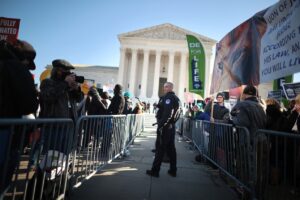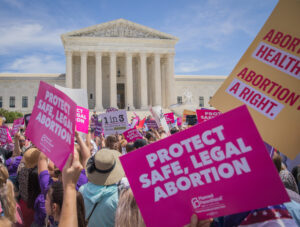Last updated on February 4, 2021
The push to get large numbers of COVID-19 vaccines administered in North Carolina to signal to federal authorities that the state can and will deplete its allotted weekly doses created friction with health care providers over the weekend and led to another distribution plan tweak.
Mandy Cohen, secretary of the state Department of Health and Human Services, outlined the vaccine distribution changes in a briefing with reporters on Tuesday.
After facing criticism several weeks ago from Republican lawmakers for the bumpy start to the vaccine rollout that left many doses on provider shelves in late December and early January, Cohen and her team turned their focus to large vaccination events to improve their numbers.
At first, DHHS allotted vaccines to counties based on population, with smaller counties receiving less, and larger counties more.
“But as we needed to move to this posture of speed and make sure we could clear our backlog because we saw that we did have vaccine building up here in North Carolina,” Cohen said. “We wanted to demonstrate to the federal government that we are ready to take on more vaccine and we want that vaccine here, we shifted our posture to one of speed.”
By the end of Monday, Cohen said, 95 percent of all first doses of the Moderna and Pfizer COVID-19 vaccines sent to the state are in someone’s arm. Cohen expected the remaining 5 percent of first doses to be administered by the end of the day.
“North Carolina vaccine providers have given more than 810,000 doses,” Cohen said, adding that 260,000 doses were given in the past week alone.
“After the federal government put all states on notice that future vaccine allocations would be based on how much supply our state had on hand, we charged our vaccine providers with exhausting North Carolina’s supply of first doses and our partners stepped up,” Cohen said. “That demonstrates to the federal government that North Carolina is ready to take on more vaccine and that we need those vaccines now.”
Taking that approach, though, meant some hospitals such as Cone Health in Guilford County and county health departments across the state were forced to cancel or postpone thousands of vaccine appointments that many older people eagerly awaited in the week ahead.
The North Carolina Association of Local Health Directors and the North Carolina Healthcare Association showered swift criticism on Cohen and Gov. Roy Cooper in letters dated Jan. 24 and Jan. 25.
Cohen on Tuesday worked to smooth it over with ruffled partners as she thanked health care providers and local health department workers many times during the Tuesday briefing for being significant frontline allies as the pandemic in North Carolina nears the one-year mark.
“These women and men have been working overtime, day in and day out, to slow the spread of the COVID-19 and save lives,” Cohen said. “They’ve cared for the thousands of North Carolinians that have needed to be hospitalized, created a testing infrastructure that has created more than eight and a half million tests. They have conducted contract tracing for a virus that has now infected more than 723,000 North Carolinians.”
“They’ve borne a weight that would break many,” Cohen added. “Yet not only have they stood firm, they have continued to rise to the occasion.”
Strive for stability in an unstable environment
The coming week, Cohen said, could “feel like a big change” to providers that have cleared vaccines from their shelves.
Based on an allocation set up by the federal government under the Trump administration, North Carolina receives 120,000 first doses of the Pfizer and Moderna vaccines each week.
“This coming week, a number of those doses are committed to a large scale event planned several weeks back, when we were addressing that backlog in vaccines,” Cohen explained. “So this week is going to feel particularly tight with many providers getting small or no allocations.”
Second dose allotments will still go where they need to go to complete people’s vaccine series.
With lessons learned from the criticism over the weekend, Cohen says her department realizes that providers need as much stability as her team can give them “in what is a very unstable environment.”
The state has shared the process it plans to follow in the coming weeks with providers that include a hybrid model that incorporates mass vaccination events while continuing to supply counties with vaccines based on population and the speed with which the first doses are administered.
Of the 120,000 first doses of vaccine allotted to the state each week, 84,000 will be distributed to the counties based on population. The remaining 36,000 doses, Cohen said, will be used to bring some counties back into the dose-per-population balance that was skewed because of the mass vaccination events.
Not only is the public health team bringing its focus back to more equitable geographic allocation. Cohen said getting shots to Black and Latinx residents and historically marginalized communities remain important.
“We will continue to reassess this as we learn,” Cohen said. “I think we will be at different moments in time as we get different information from the federal government in terms of supply, but at this moment, we’re making that shift from that push to get rid of the backlog to this more steady state, where we can give our partners some certainty.”
‘Give us more vaccine’
One thing remains certain, and Cohen underscored the point numerous times. Though many are ready to move beyond the pandemic, vaccine supplies remain limited.
President Joe Biden, who was inaugurated almost a week ago, has rolled out a COVID-19 pandemic plan that calls on government agencies to use the Defense Production Act, if necessary, to increase supplies of vaccines, personal protective equipment and other necessities in the fight against the virus.
“We do need multiple strategies to make sure we can get this vaccine out quickly,” Cohen said. “We need to continue to demonstrate to the federal government that week over week, we are getting that vaccine out quickly so that we are at the front of the line to be the one to say, ‘Give us more vaccine.’”
The state typically finds out from the federal government on Tuesday what the weekly allotment will be. DHHS updated its vaccine dashboard this week to include how many doses the federal government had allocated, how many of those doses had actually arrived in the state and how many had been administered.
As part of its new guidance to vaccine providers, Cohen’s public health team plans to let county health departments, hospitals and partners know on Thursday what their weekly allocations will be for the coming week. The providers, in turn, must get back to the state by noon on Friday with their willingness to accept all or a portion of the allotment.
If the doses are accepted, the state expects first doses that typically arrive at health care provider offices on Tuesday or Wednesday to be fully administered by the following Monday evening.
Cohen assured providers that second doses would be available based on the number of first doses administered.
“As we look ahead, because of the amazing work of our provider partners, our maximum capacity in NC will continue to outstrip our anticipated state allocation,” Cohen said in a Jan. 26 letter outlining expectations moving forward. “Despite the drop in the coming week, I cannot emphasize enough how critical it is that we stay on pace to meet our goal of using all our first doses during the week we receive them.”
Cohen recommended against scheduling appointments for first doses of vaccines on Tuesdays or Wednesdays because of the variability that providers have experienced in shipping from the federal government.
“Part of this is hard because we are working on a Wednesday to Tuesday cycle,” Cohen said. “Most shipments come on Wednesday, but sometimes it comes Tuesday or sometimes it comes Thursday, and that’s really hard for our providers to really plan clinics.”
What Cohen and her team are pushing now is for providers to get on an “operational cadence” so they get their first dose shipments quickly into arms and use Sundays, Mondays and Tuesdays to get second doses completed.
“We are all learning this together as we go,” Cohen said. “We are learning the best practices directly from our providers that are working through this on the ground. I think it’s been an incredibly collaborative process.”
Cohen reiterated that the state has set up a transfer process for providers who realize they will not be able to administer all the vaccines they received in one week.
“We’ve seen a lot of that in the last week, and I want to thank folks for being such collaborative partners,” Cohen said. “We’ve had transfers of more than 100,000 vaccines from one provider to another in order to get it out that same week. That is always going to be a part of the strategy, that is to make sure we can match vaccine with the partners who can get it out in that quick and equitable manner.”
‘All hands on deck’
Under the North Carolina plan, all health care workers and anyone 65 and older are eligible for the vaccine, a total of close to 2 million people.
Earlier this week, the state posted a new tool on the DHHS website through which residents can find the vaccine group they are in and enter contact information to be notified when they are eligible for a shot.
Many seniors have expressed frustration about trying to get vaccine appointments through their county health departments and other providers.
Public health teams across the state have borne the brunt of a pandemic that has highlighted how depleted their workforces have been over the past decade.
Now many are being overwhelmed by calls from older residents in search of appointments and confounded by online scheduling portals that can seem glitchy and difficult to navigate even for generations that are far more tech savvy.
“Now we receive more than 15,000 calls per day,” wrote Granville-Vance Health Public Health director Lisa Harrison in an email. Her department covers two counties with a combined total population of about 105,000. She noted she had as many as eight people answering phones on a given day.
Mike Sprayberry, the state director of emergency management, highlighted on Tuesday how North Carolina National Guard teams, the Civil Air Patrol, public health employees and Community Care of North Carolina workers have joined forces to tackle some of the logistical problems of vaccine distribution and administration.
“It’s all hands on deck,” Sprayberry said.
Eighteen National Guard strike teams and 18 National Guard administrative support teams, a total of 256 members, were in counties this week helping with such efforts, he said.
The Biden administration also has offered additional support for vaccination efforts through the Federal Emergency Management Agency.
Sprayberry, often referred to as “Uncle Mike” for his avuncular style during briefings throughout the pandemic and disastrous weather events, welcomed feedback from county health departments and others involved with vaccine distribution and administration.
“We value your shared input as to how we can put a better operational product out on the field,” Sprayberry said. “You continue to make a difference. We’ve had bumps along the way, but if we stay together and maintain solid lines of communications, we’ll achieve success. Just reflect on your amazing body of work over the last year. Incredible.”
On Day 323 of activation of the state’s Emergency Response Team to the pandemic, Sprayberry had a piece of personal news.
“I want to encourage everyone to get the vaccine when your turn comes,” Sprayberry said. “It’s safe and it’s free. I’m 66, and I was able to get my first shot last weekend, and I’m looking forward to getting the follow-up shot in a few weeks.”
Before closing out by telling all listening to “call your loved ones daily, they will appreciate it,” Sprayberry reminded all that it remains important to wear masks and comply with social distancing recommendations.
North Carolina’s trends and metrics have been leveling off some since post-holiday spikes. Nonetheless, the state reported 3,978 new lab-confirmed cases of COVID-19 on Tuesday and 3,368 people hospitalized with serious illness related to the virus that day. There have been a total of 8,776 COVID-related deaths.
“With kindness and cooperation, we will all get through this together as one team, one mission, and one family,” Sprayberry said.
This article was originally published on Coronavirus Today – Jan. 26 Clearing vaccine backlog; Clash with providers, distribution tweaks; Find your vaccine group






Be First to Comment